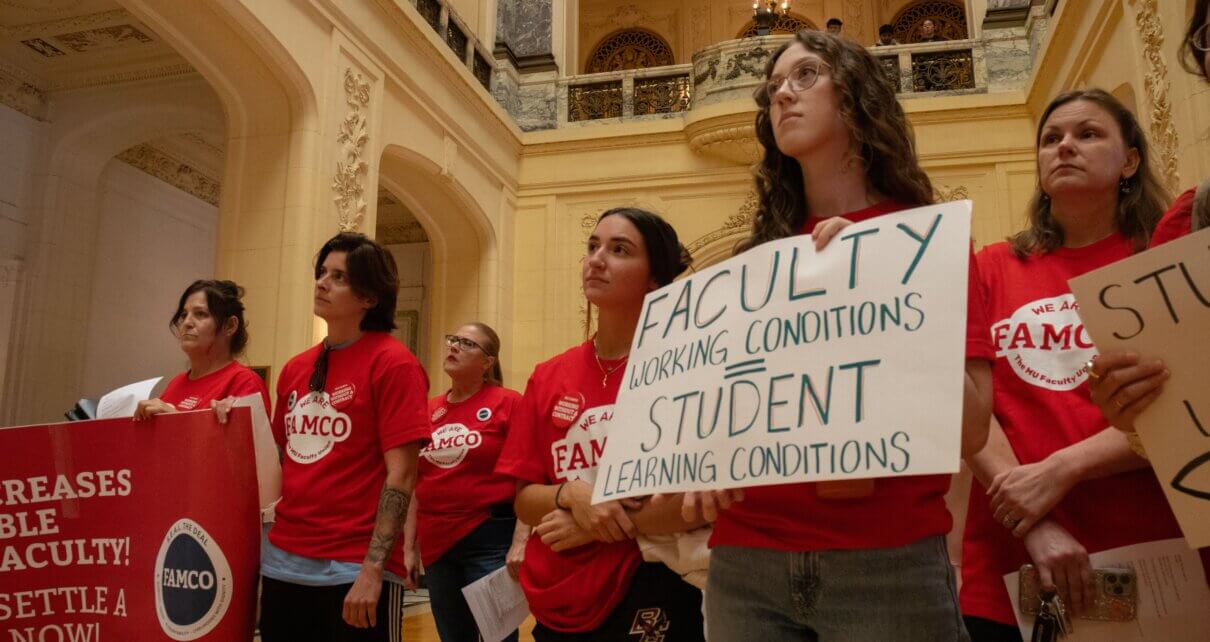On Wednesday, Sept. 18 at 3:30 p.m., over 100 Monmouth University faculty, members of FAMCO, and an estimated 20 student leaders gathered in front of Bey Hall to lead a labor action which consisted of hand delivering an open letter to President Leahy asking him to support the faculty union’s bargaining team’s fight for fair wages. FAMCO, the University’s faculty union, has been in negotiation with the administration over the terms of the faculty contract since February. Now, approaching an eight-month negotiation period, issues of healthcare, salaries, and more have yet to be settled.
“The administration doesn’t seem to hear our concerns during negotiations, so we felt the need to make a more vocal stand,” stated Elizabeth Gilmartin, PhD, professor of English, when asked about the reason behind this event.
Senior English student Meghan Reilly took part in the demonstration and remarked, “I have a lot of professors who are very involved with FAMCO and I want to support them in getting their needs met by the University. I also think it’s important to show that students actually are paying attention to what is happening and that we care deeply about the livelihoods of our educators.”
FAMCO is fighting for liveable salaries, and fair and equitable compensation across disciplines.
One professor, who wanted to speak under conditions of anonymity describes concerns over a potential drastic increase of 30-70% in health insurance premiums, urging administration to take cost of living adjustments into consideration. If this is not done, this professor worries that they along with others will no longer be able to afford to work at Monmouth University. Due to inflation, faculty lost over 8% of real earnings between 2020 and 2023, according to data collection done by FAMCO.
“When our faculty are at risk of leaving Monmouth, or distracted by stress because they can’t afford to live here, or have to pay high costs for their healthcare, or have to get a side job to keep doing what they love as professors, then that hurts our students too- and we just can’t abide by that. We are heartened to know that our students can understand how our efforts for a fair contract and our fight to protect the academic mission are one and the same,” said Johanna Foster, PhD, professor of Sociology.
FAMCO members wore red t-shirts that promoted the organization while carrying signs that supported the cause. This group attracted the attention of surrounding members of the Monmouth community who clapped and cheered on the group as they walked.
When the group made it to the Great Hall, they proceeded to the second floor to President Leahy’s office, where they were met with closed doors.
This did not stop the group as Professors Kathryn Lionetti and Richard Cox stopped in front of the doors and read aloud the letter with a megaphone in hopes that members of the administration inside would be able to hear their message.
The following day, students showed their support for the faculty union on various social media platforms. Amanda Stojanov, PhD, professor of Communication, recalled, “Since the event we have heard a number of supportive statements from staff and students, particularly through our engagement on social media…One student writes ‘My favorite professors fighting the good fight. Support fair contracts for professors and faculty on campus #FAMCO’ including a number of comments under our posts supporting the recent concerted union activity on our @mu_famco instagram page.”
Various other stories are currently linked on the @MU_FAMCO instagram account.
Additionally, parents of Monmouth students expressed support for faculty on their Facebook pages. One comment read, “Many comments today about teaching staff….Important point: These educators (name one or two that your student has spoke about) work their butts off for students…for the money we pay, educators and support staff deserve fair pay. These are the face-to-face people who teach, mentor, and support our kids every day! These professionals are WHY we send our kids here… support them, please.”
Following the event, a campus-wide email was sent out by James Pillar, EdD, Vice President for Student Life, on Friday, Sept. 20, discussing Monmouth’s Expressive Activity Policy. In the email, Pillar wrote that, “Monmouth University encourages open, ongoing intellectual engagement and debate through civil, mutually respectful interactions that preserve the openness of public dialogue and debate. Therefore, the University seeks to ensure that members of the university community (students, faculty, and staff) are aware of the Expressive Activity Policies and Procedures governing the University. These guidelines, as well as the Expressive Activity Request form, can be found on the University portal, as well as on the dean of Students’ webpage.”
Along with this email, President Leahy also sent out a response to the labor action to Monmouth employees, addressing the event and its effect on campus.
“I support – even defend – our colleagues’ rights to express themselves, especially on matters of such importance to them and to the University. Unfortunately, I was attending a meeting off campus at that time and was therefore not available to hear the protests firsthand. When I returned to the office later in the afternoon, the protest had disbanded,” Leahy stated.
“Today,” Leahy continued, “I am hearing from students and staff members about what actually transpired yesterday in the Great Hall, including using a bullhorn inside the building, marching throughout the building, disrupting students’ ability to study in space dedicated in large part to that purpose, and interrupting staff who were trying to work during the protest. I was most disheartened to learn that some protestors demonstrated threatening, aggressive, and intimidating behavior toward our fellow staff members. Students and staff members throughout the building reported to me today that they were intimidated, even scared. This is unacceptable behavior. I would not allow this type of behavior in the classroom, and I cannot allow it anywhere else on campus.”
While President’ Leahy’s email asserts that faculty was exhibiting threatening behavior and even going so far to say that they intimidated students and staff, students who were a part of the action recalled intimidating behavior coming from administrators who observed the event. Tyler Bane, military veteran and graduate student for the Department of History and Anthropology, described his experience at the event. “While exercising my First Amendment Rights at the faculty march in solidarity with faculty fighting for a fair contract, I was approached by a member of the senior school administration, who attempted to intimidate me by stating that my attendance was in violation of the student code of conduct. This was a clear attempt to chill free speech on campus.”
At the end of the email, Leahy concluded his response to the event, “I trust that future conversations regarding the current contract – however passionate – will be handled in the most professional way possible. I look forward to resolving the current contract negotiation as quickly as possible.”



